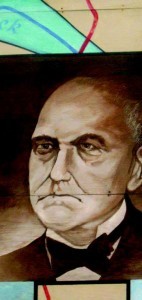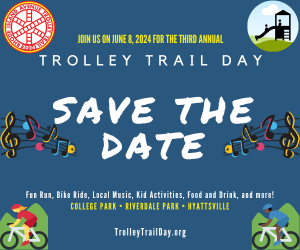 BY KIMBERLY SCHMIDT — “The chief business of the American people is business,” President Calvin Coolidge told the American Society of Newspaper Editors in 1925.
BY KIMBERLY SCHMIDT — “The chief business of the American people is business,” President Calvin Coolidge told the American Society of Newspaper Editors in 1925.
One might take issue with Coolidge’s rather limited agenda for his constituents. But in looking back at Hyattsville’s past during this 125th year of the city’s history, it is clear that businesses, mostly small mom-and-pop stores, had a central role in Hyattsville’s early years.

That was by design. City founder Christopher Clarke Hyatt purchased the land that eventually became Hyattsville because of its access to transportation and trade networks, including the Port of Bladensburg and roads that connected Washington to Baltimore and Hagerstown.
Hyatt, whose frowning visage presides over Route 1 from a mural bordering Centennial Park, must have been a fairly astute and clever guy.
His great-grandfather had sailed from England to the New World in 1634 and eventually owned 900 acres of land, some of which was patented from Lord Baltimore. Like his ancestor, young Hyatt had precocious business skills. He purchased “Rich Thickett,” 273 acres of land in Beltsville, from his father in 1807 at the tender age of 8.
He was hired by a Baltimore merchant and was put in charge of the business’s Pennsylvania branch when he was still a teenager. So by the time he focused his energies on this area, he had already honed his considerable business skills.
Records show that Hyatt started a trading post in 1832 and, according to Hyattsville:Our Hometown, purchased “extensive supplies for the farm and household including tobacco, slaves, farm produce and even a bear.” (What use he had for the bear is not found in the historical record.) He was active in civic and church affairs and was also appointed Hyattsville’s first postmaster.
By the 1880s, the town boasted three grocery stores, three butcher shops, a dry goods store, a “notions” shop, post office, blacksmith and tinsmith. There were two wood dealers, two coal dealers, a livery stable, two town fire halls and a land office. These establishments were walking distance from Hyattsville’s core residential area.
Hyatt continued to eagerly purchase large tracts of land – so much so that by the late 1870s he was in debt, owing more than $25,000 to 40 creditors. Perhaps he was a victim of the economic downturn experienced in the United States at the time. Perhaps his business acumen was better suited to a pre-Civil War world. Perhaps it was a simple case of an ambitious overextension of property. Whatever the case, by 1878 he had sold all his household furnishings and much of his property in order to pay his creditors.
Although the name Hyattsville had been used since 1865, Christopher Clarke Hyatt did not live to see the town incorporated. He died in 1884, two years before the town became “official,” leaving a legacy that could serve either as inspiration or as a cautionary tale.
Kimberly Schmidt is a former president and current board member of the Hyattsville Preservation Association.








